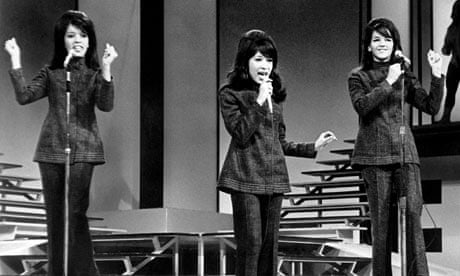The first wave of New York girl groups, whose music filled the airwaves during the interregnum that separated Elvis Presley's rock'n'roll heyday from the arrival of the Beatles, epitomised decorum. Smiling teenagers with neat hairdos and taffeta prom dresses, the members of the Shirelles, the Chiffons and the Crystals were suburban housewives in the making. As one of the Ronettes, however, Estelle Bennett, who has died of colon cancer aged 67, was a very different proposition.
With their heavy mascara, exaggerated beehives and tight dresses, the Ronettes looked like trouble, even when they were smiling for the camera. Their street-corner chic, adapted from the Spanish Harlem hoodlums among whom they had grown up, cast a spell upon young men of the early 1960s, including the members of the Beatles and the Rolling Stones. The queue of suitors attracted to Estelle, the oldest and quietest member of the trio, included Mick Jagger and George Harrison. The image proved more influential than that of the myriad housewives-in-waiting who were their rivals in the pop charts of the early 1960s. From the Shangri-Las through Deborah Harry to Duffy, countless singers would take inspiration from the Ronettes' sound and attitude.
Estelle was not the group's lead singer. That role was taken by her extrovert younger sister Veronica, better known as Ronnie, whose voice throbbed with a sensuality that provided the group's trademark sound during the days when their hit records - including Be My Baby, Baby I Love You and Walking in the Rain - were being masterminded by the producer Phil Spector. The group's third member, Nedra Talley, was a cousin of the Bennett sisters.
The children of a white father and a mother of African-American and Cherokee descent, Estelle and Ronnie were bullied at school, where their long straight hair and mixed-race looks made them stand out. Estelle, who read Vogue, was thought to be a snob, and Ronnie's beauty attracted jealousy. While Estelle did her homework and made plans that would eventually see her study at Manhattan's Fashion Institute of Technology, Ronnie shut herself in her bedroom. Turning her bedside lamp into a spotlight, she used a wooden spoon as a microphone and sang along to the records of Frankie Lymon and the Teenagers.
When Ronnie was 14, she and Estelle formed a singing group with Nedra, who was half-Spanish, and three other cousins, two girls and a boy. Their mother, Beatrice, worked as a waitress at a doughnut restaurant opposite the Apollo Theatre, whose owner was a customer and was persuaded to give the group a slot in the Wednesday night talent contest. When Ira, the boy cousin, froze at the microphone, Ronnie stepped forward to fill the breach and never stepped back. Cut down to a trio, the group took singing lessons at the Camilucci Studio on 57th Street and acquired an agent. Briefly known as the Darling Sisters, they were renamed Ronnie and the Relatives by Beatrice in time for their first recording sessions, which produced a dozen unmemorable and unsuccessful sides for the Colpix label.
After Beatrice had shown them how to stuff Kleenex down their bras, they were hired as dancers at the fashionable Peppermint Lounge, where Joey Dee and the Starliters were helping to popularise the Twist. They backed Del Shannon and Bobby Rydell on record and were in line to appear in Hey, Let's Twist, a 1961 exploitation movie, until they heard the verdict of the casting director: "They're too light to play black girls and too dark to play white girls. The audience wouldn't know if they were supposed to be black or white."
A family conference led to the invention of the Ronettes as their new name, and - according to the account in Ronnie's autobiography, subsequently disputed by Nedra - it was Estelle who made the telephone call that changed their destiny. From the bedroom she shared with Ronnie, she rang Phil Spector's office and got through to the 23-year-old whizzkid producer himself. Granted an audition, the girls were offered a contract on the spot. For their first single on his Philles label, Spector placed Ronnie's heavy vibrato in front of his massed orchestra of session musicians on a song he had written with Jeff Barry and Ellie Greenwich. With its pounding baion rhythm and soaring choir, Be My Baby was among the finest examples of Spector's "little symphonies for the kids", and became a top five hit in both Britain and the US.
By the beginning of 1964 they were popular enough to tour the UK with the Rolling Stones as their support act, and befriended the Beatles. Ronnie and Spector had started an affair, which would culminate in marriage (and, ultimately, an acrimonious divorce), but the group's popularity quickly waned and in 1966 they called it a day.
Estelle married the group's road manager, Joe Dong. Of all the three Ronettes, she was the one most disappointed by the break-up. She joined their fruitless lawsuit against Spector for unpaid royalties, which ran from 1988 to 2001, and was present when they were inducted into the Rock and Roll Hall of Fame in 2007, but while Ronnie carried on making comebacks, Estelle's last years were reportedly disrupted by schizophrenia, anorexia and homelessness.
She leaves a daughter, Toyin, and three grandsons.
